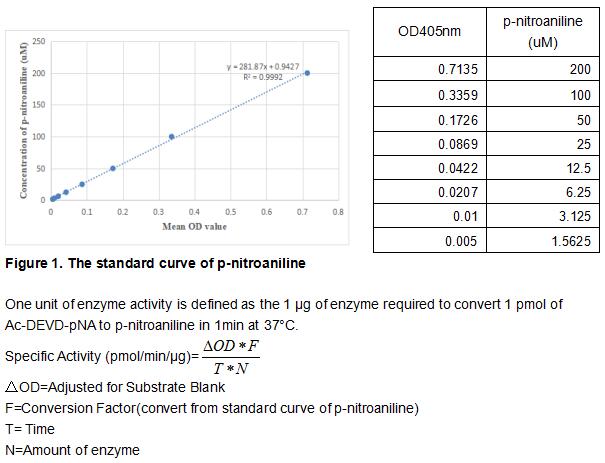Active Caspase 3 (CASP3)
CPP32; CPP32B; SCA1; Apoptain; Yama; Apoptosis-Related Cysteine Peptidase; Cysteinyl Aspartate Specific Proteinases 3; SREBP cleavage activity 1
- Product No.APA626Mu02
- Organism SpeciesMus musculus (Mouse) Same name, Different species.
- Buffer FormulationPBS, pH7.4, containing 0.01% SKL, 5% Trehalose.
- TraitsFreeze-dried powder
- Purity> 90%
- Isoelectric Point6.9
- ApplicationsCell culture; Activity Assays.
- Download Instruction Manual
- UOM 10µg50µg 200µg 1mg 5mg
-
FOB
US$
For more details, please contact local distributors!US$
For more details, please contact local distributors! US$
For more details, please contact local distributors! US$
For more details, please contact local distributors! US$
For more details, please contact local distributors!
ACTIVITY TEST of the Active Caspase 3 (CASP3)

Caspase 3 is a member of the cysteine-aspartic acid protease (caspase) family. Sequential activation of caspases plays a central role in the execution-phase of cell apoptosis. Caspases exist as inactive proenzymes that undergo proteolytic processing at conserved aspartic residues to produce two subunits, large and small, that dimerize to form the active enzyme. This protein cleaves and activates caspase 6 and 7; and the protein itself is processed and activated by caspases 8, 9, and 10. Caspase 3 can hydrolyze the peptide substrate acetyl-Asp-Glu-Val-Asp-p-nitroanilide (Ac-DEVD-pNA) resulting in the release of the p-nitroaniline (pNA) moiety. p-Nitroaniline has a high absorbance at 405 nm. Thus the activity of recombinant mouse caspase 3 can be measuered by calculating the concentration of the pNA released from the substrate. The reaction was performed in adding 50 μl 2×buffer (50mM HEPES,100mM NaCl,10mM DTT, 2mM EDTA, 10% glycerol) to 96 well plates, then add 50 μl various concentrations of caspase 3 (diluted by 1×buffer, 25mM HEPES, 50mM NaCl, 5mM DTT, 1mM EDTA, 5% glycerol) to each well, finally, add 5 μl 4mM Ac-DEVD-pNA to each well. Cover the 96 well plates and incubate at 37 ℃ for 1h. p-Nitroaniline (pNA) Standard curve prepare by double dilute 200 μM pNA with 1×buffer and record the OD value at 405 nm. The specific activity of recombinant mouse caspase3 is >3000 pmol/min/µg.
USAGE of the Active Caspase 3 (CASP3)
Reconstitute in 10mM PBS (pH7.4) to a concentration of 0.1-1.0 mg/mL. Do not vortex.
STORAGE of the Active Caspase 3 (CASP3)
Avoid repeated freeze/thaw cycles. Store at 2-8°C for one month. Aliquot and store at -80°C for 12 months.
STABILITY of the Active Caspase 3 (CASP3)
The thermal stability is described by the loss rate. The loss rate was determined by accelerated thermal degradation test, that is, incubate the protein at 37°C for 48h, and no obvious degradation and precipitation were observed. The loss rate is less than 5% within the expiration date under appropriate storage condition.
INCREMENT SERVICES
BCA Protein Quantification Kit
Molecular Mass Marker for Protein
Monoclonal Antibody Customized Service
Polyclonal Antibody Customized Service
Protein Activity Test Experiment Service
Electrophoretic Mobility Shift Assay (EMSA) Experiment Service
Buffer
Lentivirus Packaging Experiment Service
Adenovirus Packaging Experiment Service
Real Time PCR Experimental Service
Spike RBD Protein (S-RBD)
Protein G
Protein A
Related products
| Catalog No. | Organism species: Mus musculus (Mouse) | Applications (RESEARCH USE ONLY!) |
| APA626Mu02 | Active Caspase 3 (CASP3) | Cell culture; Activity Assays. |
| RPA626Mu01 | Recombinant Caspase 3 (CASP3) | Positive Control; Immunogen; SDS-PAGE; WB. |
| RPA626Mu02 | Recombinant Caspase 3 (CASP3) | Positive Control; Immunogen; SDS-PAGE; WB. |
| PAA626Mu02 | Polyclonal Antibody to Caspase 3 (CASP3) | WB; IHC; ICC; IP. |
| PAA626Mu01 | Polyclonal Antibody to Caspase 3 (CASP3) | WB; IHC; ICC; IP. |
| LAA626Mu71 | Biotin-Linked Polyclonal Antibody to Caspase 3 (CASP3) | WB; IHC; ICC. |
| LAA626Mu81 | FITC-Linked Polyclonal Antibody to Caspase 3 (CASP3) | WB; IHC; ICC; IF. |
| SEA626Mu | ELISA Kit for Caspase 3 (CASP3) | Enzyme-linked immunosorbent assay for Antigen Detection. |
| LMA626Mu | Multiplex Assay Kit for Caspase 3 (CASP3) ,etc. by FLIA (Flow Luminescence Immunoassay) | FLIA Kit for Antigen Detection. |
| KSA626Mu01 | ELISA Kit DIY Materials for Caspase 3 (CASP3) | Main materials for "Do It (ELISA Kit) Yourself". |

